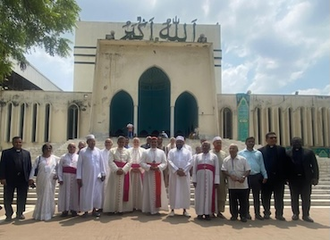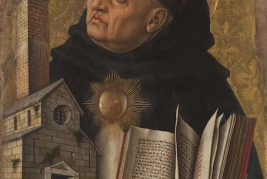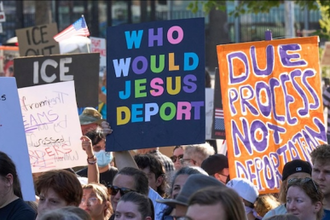Building Bridges: A Journey of Dialogue in Dhaka

The gathering in Dakha
Recently, I received an invitation from the Dicastery for Dialogue in Rome and the Apostolic Nunciature in Bangladesh to join a delegation from Rome during its visit to Dhaka, Bangladesh, for a week-long programme on engaging in dialogue with people of other faiths, particularly Muslims. This esteemed group included His Eminence George Jacob Cardinal Koovacad, the Cardinal Prefect; Monsignor Indunil Kodithavakku, the secretary of the Dicastery; and Fr. Marcus Solo SVD, who oversees the Islam Desk for Asia and Pacific at the Dicastery. The programme was jointly organised by the Dicastery for Dialogue, Rome, the Catholic Bishops' Conference of Bangladesh, and the Apostolic Nunciature in Dhaka, Bangladesh. Among the scheduled activities was a visit to a mosque, which added a meaningful element to our itinerary.
It was truly a significant occasion for us, the Christian delegation, to receive a warm welcome in this hallowed space. This gesture of hospitality carries profound historical importance. The Prophet Muhammad, peace be upon him, graciously received a Christian delegation during his lifetime. In more contemporary times, we have witnessed prominent figures such as Pope John Paul II, Pope Benedict XVI, and Pope Francis visiting mosques. Notably, Pope John Paul II made history as the first pope to enter a mosque during his visit to Syria in 2001. The sight of him, a frail figure, entering the Umayyad Mosque in Damascus with deep reverence, was a pivotal moment in enhancing relations between our faiths. In 2009, Pope Benedict XVI visited the Al-Hussein Bin Talal Mosque in Jordan, underscoring the significance of acknowledging both Muslims and Christians as sincere worshipers of God. Pope Francis has continued this path of unity by visiting the Grand Mosque in Abu Dhabi in 2019 for an interfaith gathering, where he emphasized the necessity of tolerance and respect among individuals of diverse faiths. Earlier, during his visit to the Blue Mosque in Istanbul in 2014, he addressed the themes of unity and peace among humanity, and just last year at the Istiqlal Mosque, he called upon all people of goodwill to foster harmony and engage in dialogue for mutual respect and peaceful coexistence.
The actions of Pope Paul VI, Pope John Paul II, Pope Benedict XVI, and Pope Francis reflect the principles outlined in Nostra Aetate, an important document from Vatican II that conveys a profound respect for Muslims. Each of these popes engaged with Islam and its followers in meaningful ways. Pope Paul VI made it clear that differences in faith should not lead to conflict, asserting that Islam is not an enemy of Christianity. He emphasized that other religions pose no threat to Christianity and urged Christians to foster an environment conducive to dialogue among all faiths. Similarly, Pope John Paul II positioned himself as a bridge builder between Christianity and Islam, recognizing that the Spirit of God is also active in different religious traditions. Pope Benedict XVI promoted authentic dialogue aimed at both purification and enrichment, encouraging quality interactions among prominent thinkers. Meanwhile, Pope Francis exemplified how every person of faith should behave, providing fresh inspiration for Christian engagement with Muslims. He called on all people of goodwill to respect and love one another as brothers and sisters, to empathize with the suffering of others, and prayed that no one would misuse the name of God to perpetrate violence, urging collective efforts towards justice and peace. As I entered Baitul Mukkaram mosque, I felt a wave of consolation remembering the teachings of these recent popes.
I had the privilege of studying at Aligarh Muslim University (AMU) and Jamia Millia Islamia (JMI), where I earned my Master's in Islamic Studies from AMU and went on to receive a doctorate in the same field from JMI in New Delhi. My doctoral thesis was supervised by the esteemed Islamic scholar, Professor Akhtarul Wasey.
Throughout my time in Aligarh and Delhi, as a student of Islamic Studies, I engaged in meaningful dialogues with my peers, often meeting at a tea stall on campus or gathering beneath the shade of a tree near one of the mosques. During those quieter moments near the mosque, I found myself reflecting on the nature of God and humanity, often inspired by the Mihrab. The Mihrab acts as a guide for Muslims, directing their prayers five times a day. I frequently contemplated its significance for me as a Christian. While it directs Muslims to worship one God, who has "spoken to men and women" through the prophets, culminating in Muhammad, peace be upon him, it also resonates with my faith in God's revelation to humanity through Christ. I view the Mihrab as a beacon illuminating my conviction in Christian truth. Are we not both devoted worshipers of God? In that understanding, I find comfort knowing that we seek to worship one God, despite our significant differences in belief.
In closing, I want to emphasise my strong belief that personal engagement with Muslims fosters mutual understanding and unveils our shared humanity and desire for peace. I am convinced that regular interactions with people from diverse backgrounds can gradually cultivate a culture of dialogue. Cardinal Fitzgerald, a prominent authority on Christian-Muslim relations, explains that Nostra Aetate illustrates how "Christians and Muslims collectively uphold peace, freedom, social justice, and ethical values." He elaborates on this by stating that "the scope is broad and can encompass vital issues such as the protection of life, marriage, family, environmental stewardship, and endeavors toward nuclear disarmament." To me, dialogue is a conscious decision to rise above our differences, fostering goodwill and a spirit of collaboration for the common good.


















